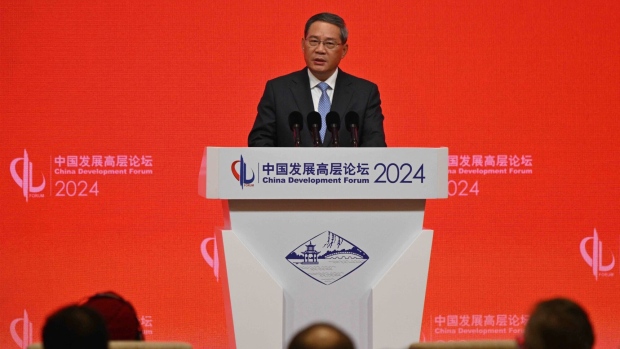Mar 23, 2024
Chinese Premier Downplays Economy Risks, Highlights Policy Space
, Bloomberg News

(Bloomberg) -- Chinese Premier Li Qiang downplayed concerns about challenges facing the economy and reassured investors that Beijing will step up supportive measures for growth, as the International Monetary Fund called on the government to carry out pro-market reforms.
There’s still plenty of space for macroeconomic policies to be expanded because consumer price growth is “relatively low” and the central government’s debt level is not high, Li said during a keynote speech at the China Development Forum on Sunday — the first given by the sitting premier since the event started in 2000, according to a Bloomberg review of agendas. China’s overall demand is “still insufficient,” he said.
While Li acknowledged that many are concerned about risks in China’s property sector and local government debt, he said “some difficulties and problems are not as serious as people think.” Steps taken to limit risks in those areas have shown positive development, he added.
Read more: Chinese Minister Woos Global Executives Amid Trade Tensions
The world’s second-largest economy has reported a solid start to 2024, with growth in exports, industrial production and investment beating expectations. That has reduced the urgency for authorities to add stimulus in the short term, though economists say more policy support is needed to reach the ambitious economic growth target of around 5% this year.
The longer-term outlook faces a number of challenges, including a deflation streak not seen since the 1990s, an extended property downturn and low confidence among overseas investors. Foreign businesses’ new direct investment into China slumped to a 30-year low in 2023 amid rising geopolitical tensions and higher interest rates elsewhere, with top officials vowing to focus on luring overseas capital this year.
Speaking at the same event, IMF Managing Director Kristalina Georgieva said China could see additional growth of 20% over the next 15 years if it conducts reforms to address a broad range of issues including the property market woes, domestic consumption, the business environment, the regulatory framework for artificial intelligence and electricity pricing.
“With a comprehensive package of pro-market reforms, China could grow considerably faster than a status quo scenario,” she said, estimating the gross domestic product to be added would be worth $3.5 trillion in todays’ terms.
International CEOs including Apple Inc.’s Tim Cook, Pfizer Inc.’s Albert Bourla and FedEx Corp.’s Raj Subramaniam are set to participate in panel discussions. While Chinese premiers typically hold a meeting with business chiefs at the forum, the two-decade tradition may be broken this year with the Wall Street Journal reporting President Xi Jinping may instead gather with company leaders after the event.
Li highlighted several measures the government is planning to take to boost domestic demand this year. They include reducing barriers to a unified domestic market, granting urban residency to people who have moved to cities from the countryside, as well as a campaign to encourage consumers and businesses to replace old goods and equipment.
He also stressed China’s focus on developing advanced manufacturing and technologies, saying new growth drivers have strengthened, and the share of strategic, emerging industries in the overall economy has increased over the past decade. He reiterated the country didn’t seek short-term growth at the expense of accumulating longer-term risks.
Li didn’t elaborate on how policies can be stepped up, other than outline what was announced at annual parliamentary sessions earlier this month which included slightly stronger fiscal stimulus. He said the country will continue to push for overall borrowing costs to decline, after guiding banks to cut a reference rate for mortgages by a record last month.
Read more: China’s Bold Mortgage Rate Cut Met With Lukewarm Reaction
--With assistance from Fran Wang.
(Updates with IMF chief’s comments in the sixth and seventh paragraphs.)
©2024 Bloomberg L.P.





